.
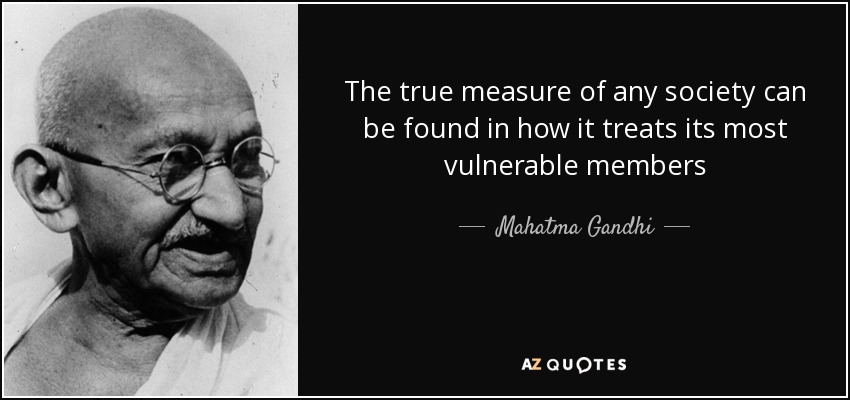
.
Up till recently, I had believed that there were two facets comprising to create a neo-liberal economy (not “society” – neo-liberalism does not recognise community or society where individuals organise for a greater collective good).
The first was a free market predicated on minimal regulation; reduced government; greater reliance of private enterprise to deliver services; and a lower tax-take which forces future left-leaning governments to curtail vital infra-structure and social-spending.
As Coalition Finance Minister, Grant Robertson clearly told the told the country in March this year;
“We’ve put aside $42bn over the next four years for capital investment but you know what? It won’t be enough. We understand that we need to take a more innovative approach to the financing of infrastructure.”
Which was well understood by National’s former Finance Minister, Steven Joyce, when he accused Labour of a so-called “$11.7 billion fiscal hole” in their pre-election costings.
National’s tax cuts of 2009 and 2010 were not just an election bribe at a time the country could ill afford them – they were a strategic move to constrain a future Labour-led government in a tight fiscal straight-jacket.
Then-Finance Minister, Bill English, said that the 2009 tax cut represented a $1 billion loss of revenue to the National government;
“About 1.5 million workers will receive a personal tax cut, injecting an extra $1 billion into the economy in the coming year.”
The following year, National’s tax would be estimated to cost the State at least $2 billion in lost revenue.
This was well-under-stood by commentators, analysts, politicians. National-leaning John Armstrong explained this in straight-forward terms;
The message is Labour – if it wins – is not going to spend money the new Government will not have…
… is not going to make promises in advance he cannot keep.
[…]
The yawning chasm of the Budget deficit meant there was no new money to spend. Some cherished policies would have to be introduced progressively – rather than in one go. Savings would have to be found; sacrifices would have to be made. And so on.
That was penned by Mr Armstrong in 2011. It still holds true today.
The second facet of neo-liberalism is promulgation and amplification of the Cult of the Individual. Whether this means cheaper imported goods at the expense of local industry and jobs; doing away with retailing restrictions (or even planned, deliberate breaking of the law); easier access to alcohol and subsequent social impacts; the primacy of the Individual’s rights for self-interest and gratification would trump communities expectations of collective responsibility; social cohesion; the health and wellbeing of the population, and the greater good.
For example, attempts by communities to restrict and reign in plentiful availability of cheap alcohol is usually met with a predictable vocal chorus of indignant outrage from people for whom the Right To Buy When/Where-ever supercedes any societal problems. The most spurious arguments are presented, attempting to portray consumers as hapless “victims” of “bureaucracy-gone-made”. Or “Nanny statism”.
Yet, the cost of alcohol abuse was estimated to be approximately $5.3 billion in 2016. That’s $5.3 billion that could have been invested in education, health, public transport, housing, conservation and pest control, increased research in green technologies, etc.
The heavy costs of alcohol abuse is socialised, whilst profits are privatised to business and their shareholders. For many, it is more important to be able to buy a drink at 4am in the morning than social problems arising from easy availability. For some individuals, that convenience outstrips whatever harm is occurring elsewhere. “It’s not my problem”, is the thought that often runs through the minds of many who demand their rights – regardless of consequences.
But there is a third aspect – like a third leg to a three-legged stool – that must exist if neo-liberalism is to thrive: Cruelty.
A certain amount of callousness; disdain; and outright hatred must replace compassion, egalitarianism, and a sense of community cohesion if the neo-liberal version of “society” is to operate successfully.
It is the reason why neo-liberalism never took hold in Scandinavian countries.
It is the reason why – once a foothold was gained in the late 1980s – successive governments ensured the neo-liberal model was maintained in this country.
Almost by definition, neo-liberalism cannot operate in a society which has values diametrically opposed to it. It took an “economic crisis” in 1984/85 for the Lange-led Labour government to impose Rogernomics.
In 1991, Ruth Richardson used the “BNZ Crisis” to implement drastic cuts to health, education and welfare. Housing NZ tenants were forced to pay market rents. User-pays was introduced for hospitals and schools – though the public resisted and ignored the $50/nightly charge for public hospitals.
Neo-liberalism could not have been introduced so easily without the convenient constructs of various so-called “economic crises”. The mainstream media at the time was complicit in the “reforms” sweeping every aspect of New Zealand’s cultural, social, and economic activity.
But once introduced, the speed of so-called “reforms” accelerated and opposition became harder. Mass protests seemingly had little or no effect. The change of government in 1990 from Labour to National only made matters worse – Richardson’s “Mother of All Budgets” plunged the country further into recession.
For the following thirty years, the neo-liberal paradigm ruled unchallenged, with perhaps the rear-guard action from the now-defunct Alliance, and a few stubborn media commentators who still asked uncomfortable questions where we were heading as a country.
By 2002, the Alliance was crippled and forced out of Parliament.
The remaining critical voices of media commentators grew fewer and fewer.
The “revolution” was all but complete. Neo-liberalism was bedded-in, supported by a propertied Middle Class feeling “wealthy” with bloated house-values and bribed with seven tax cuts since 1986.
But all was not well in Neo-liberal Nirvana.
There were embarrassing reminders that the notion of “trickle down” – now repudiated by the New Right as an ‘invention’ by the Left – was not working as per expectations of devotees of the Chicago School model. As Budget Director for the Reagan Administration, David Stockman, said;
“It’s kind of hard to sell ‘trickle down, so the supply-side formula was the only way to get a tax policy that was really ‘trickle down.’ Supply-side is ‘trickle-down’ theory.”
It became apparent that the promises of neo-liberalism were largely faith-based. Enormous social problems were being caused as corporate power increased; union power waned; wages stagnated; wealth drained away to a tiny minority; and simple things like home ownership rates were falling dramatically.
Tellingly, it was the gradual loss of the great Kiwi Dream of home ownership that was a litmus test-paper for the toxicity of neo-liberalism’s false premises and empty promises.
Ironically, this was happening at a time when mortgage money was easier and cheaper to obtain from the banks. But only if you earned a high income or already owned property to borrow against. Or could rely on the Bank of Mum and Dad.
Those who already had the assets could hope to get more.
Those at the bottom, or struggling middle classes, would miss out.
For many, they discovered that hitting rock-bottom wasn’t as low as you could go. For growing numbers of New Zealanders, “bottom” meant a shredded welfare safety-net that had gaping holes in it under the National government;
.
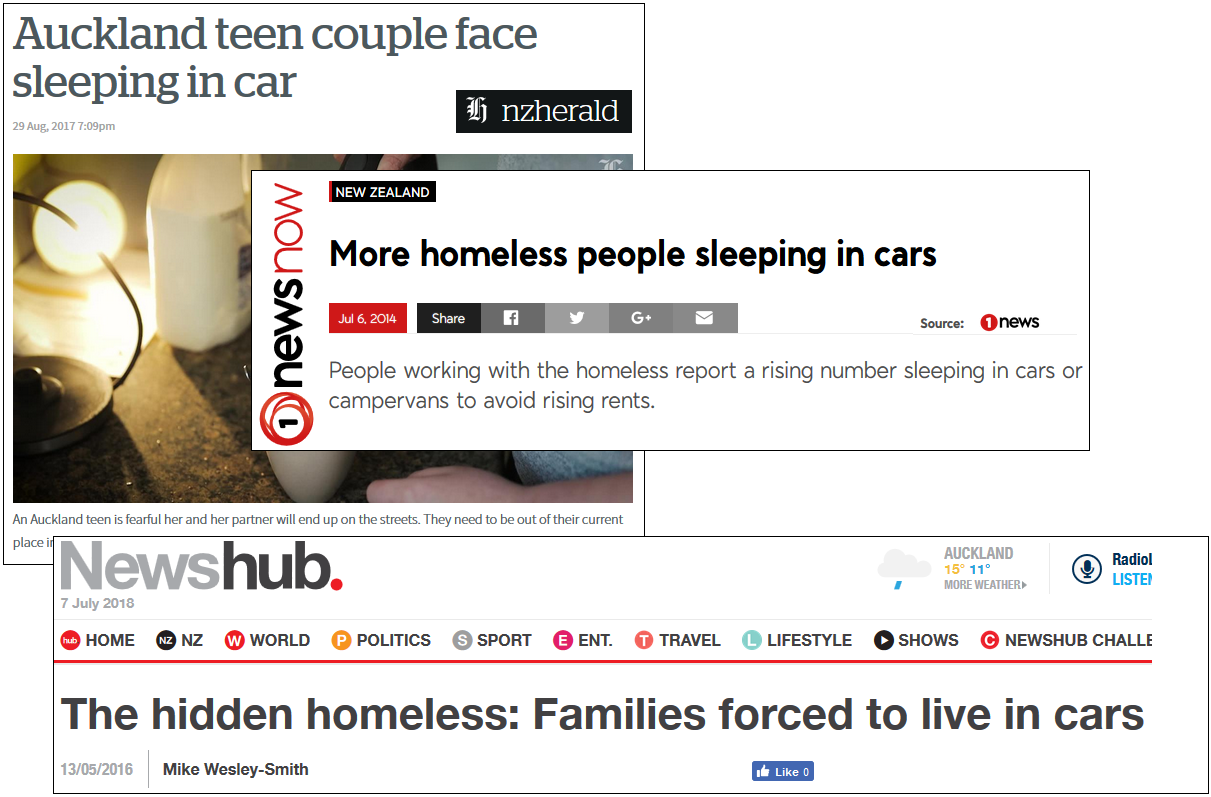
.
Added to a mounting housing crisis, various National ministers exploited every opportunity to portray the poor; the homeless; the chronically sick; unemployed; young people; in the worst possible light. They were authors of their own misfortune, according to former PM, John Key;
.
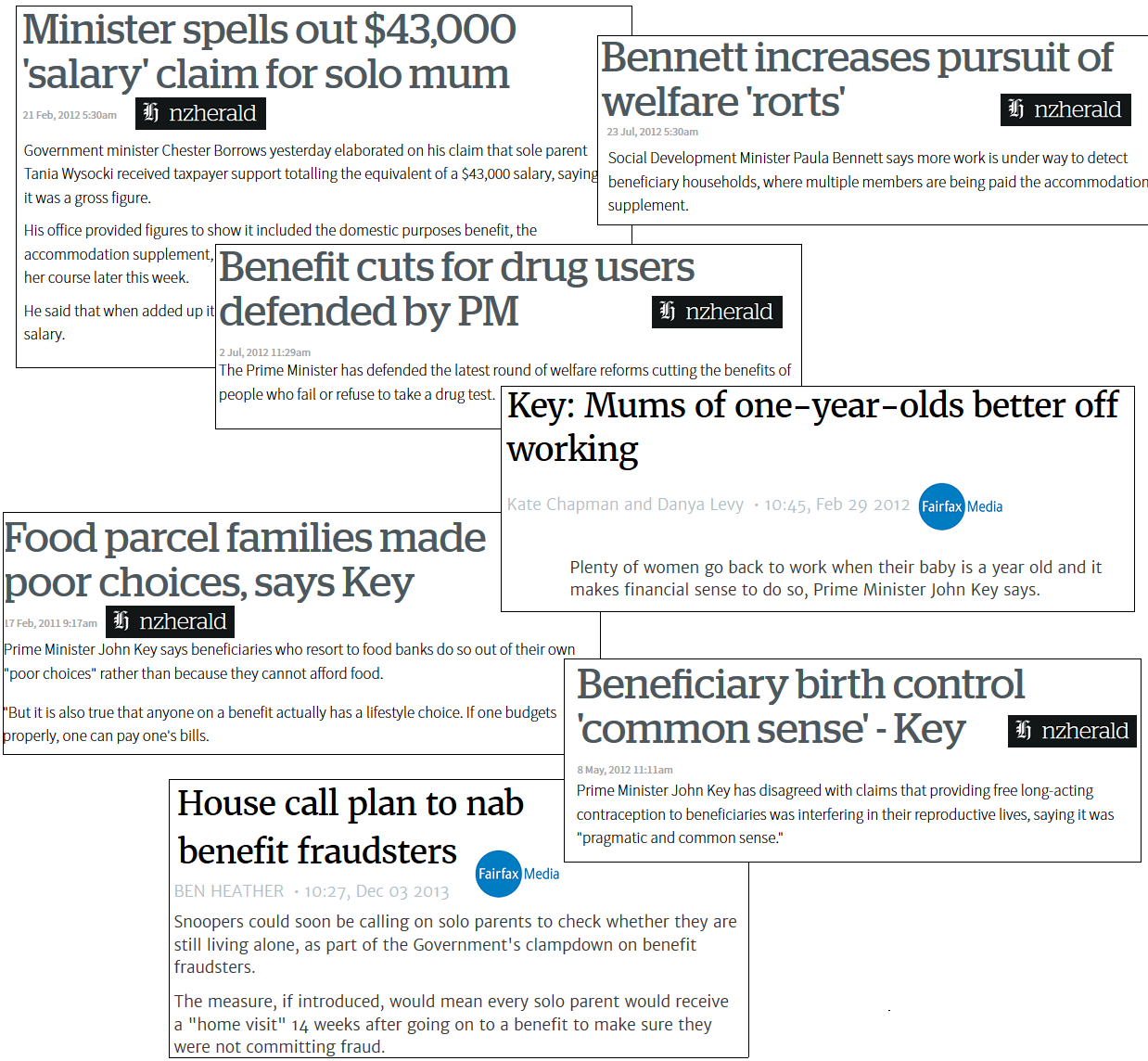
.
National’s Bill English disdain for young unemployed was made abundantly clear on several occasions;
“ A lot of the Kiwis that are meant to be available [for farm work] are pretty damned hopeless. They won’t show up. You can’t rely on them and that is one of the reasons why immigration’s a bit permissive, to fill that gap… a cohort of Kiwis who now can’t get a license because they can’t read and write properly and don’t look to be employable, you know, basically young males.”
“ One of the hurdles these days is just passing a drug test. Under workplace safety you can’t have people on your premises under the influence of drugs and a lot of our younger people can’t pass that test.”
And again in December this year;
“Government’s fees-free policy will ‘soak up staff out of McDonald’s’...”
English’s demonisation of unemployed and young New Zealander’s appeared at complete variance with those same people desperate for paid work. But that did not make him pause in his attacks.
Housing for the poor, the homeless, and vulnerable was also on National’s “hit list”, as they pursued their agenda to down-size state activity in housing.
First came the “reviews” and people’s live upended as National ended tenancies based on an ideological notion that state houses were not for life. The social problems resulting would be euphemistically known later as “unintended consequences”;
.
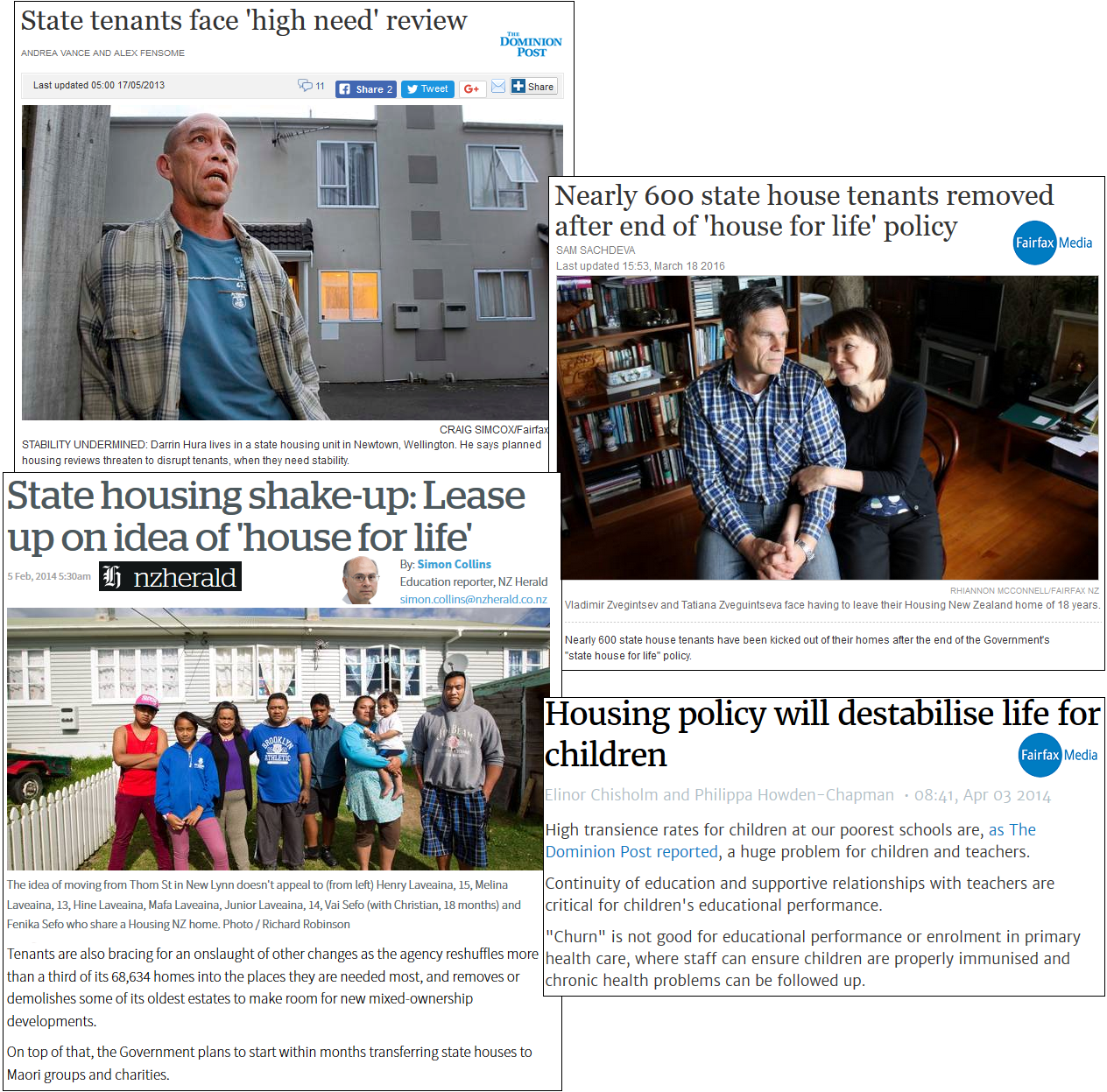
.
National’s response was predictable,
.
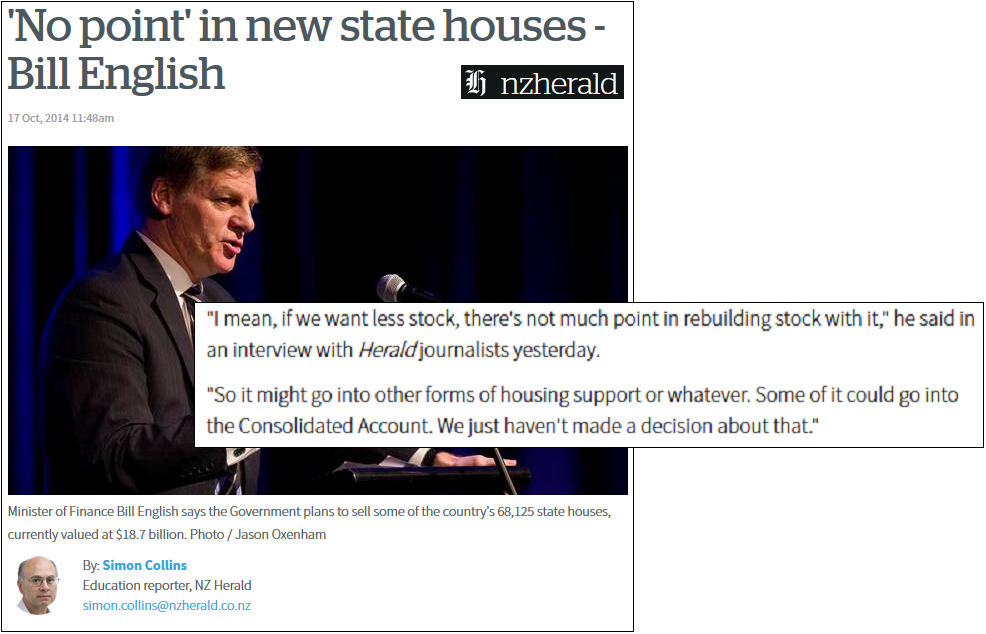
.
Therein lay their own seeds for electoral defeat three years later.
In the years that followed, National portrayed welfare beneficiaries and Housing NZ tenants as negatively as they could possibly get away with.
The meth-hysteria portrayed HNZ tenants as hopeless, lazy drug fiends. National was only too happy to fan the flames of demonisation, as it allowed National to evict tenants and sell off state houses. Their policy in September last year was unequivocal, and linked gangs and drugs, with Housing NZ tenants;
.
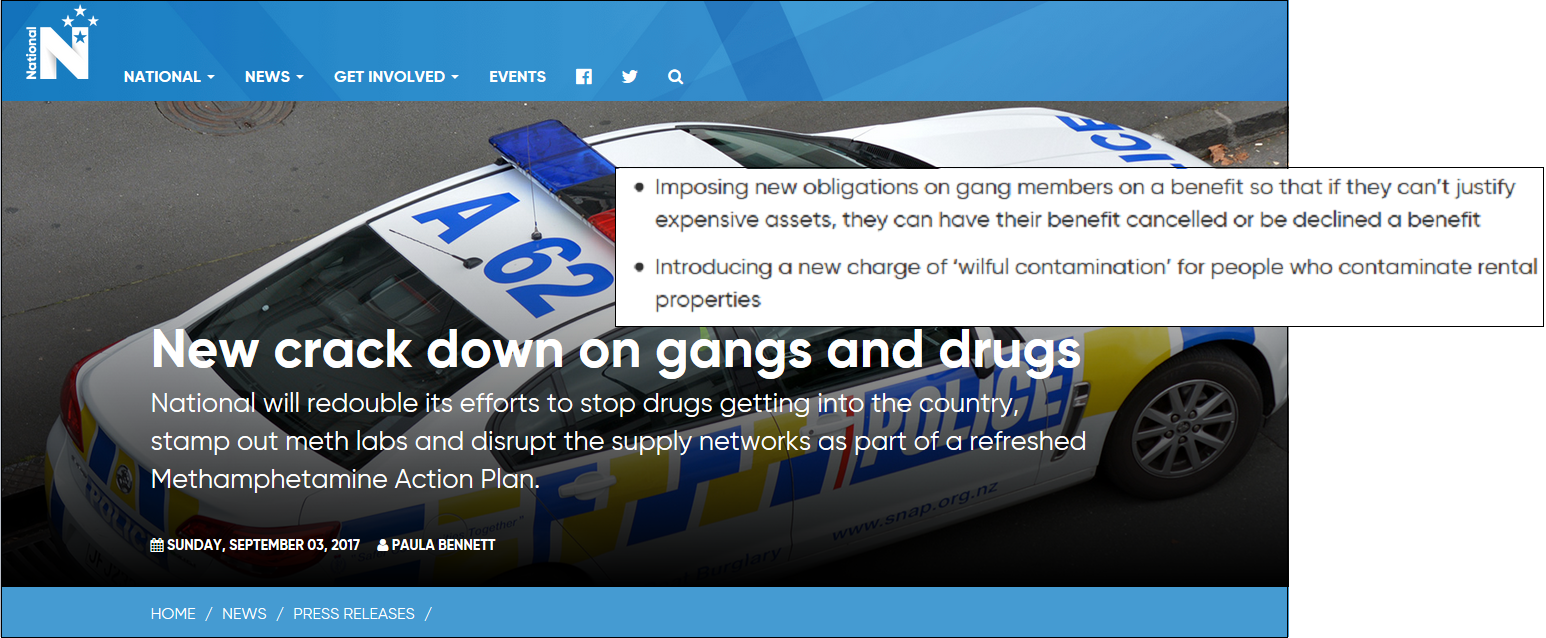
.
The press statement above was issued by former welfare beneficiary-turned-National Minister, Paula Bennett. The same Paula Bennett who, only eight months later, lamented on Radio NZ;
“I’ve always had concerns… I just didn’t think that the 0.5 [microgram limit] sounded right. I questioned [the Health Ministry] in particular who had set that standard, questioned Housing NZ numerous times, got the Standards Authority involved.”
She suggested tenants should be compensated. That was ‘big’ of her.
She also stated,
“[I] was horrified that people might be smoking P in houses, I’m not going to shy away from that.
Then I started seeing reports and I remember one in particular from an expert – he said, ‘You can just about get more P residue off a $5 note than you could have at some of these houses with 0.5 micrograms’ and so that raised alarm bells for me.
But … then who am I to be standing in and saying at what level I felt that [the limit] should be?”
Maybe she could have asked Sir Peter Gluckman. He was the government’s Science Advisor at the time. The one appointed by John Key. Yeah, that one.
Or, she could have paid more attention to a 2014 MSD report which revealed a staggeringly low rate of drug-use amongst welfare beneficiaries;
.

.
Yeah, that one!
But that would have gotten in the way of National’s cunning plan.
Plans that drove thousands of welfare rolls, as Key’s administration struggled to balance the government’s books after two unaffordable tax cuts in 2009 and 2010;
.
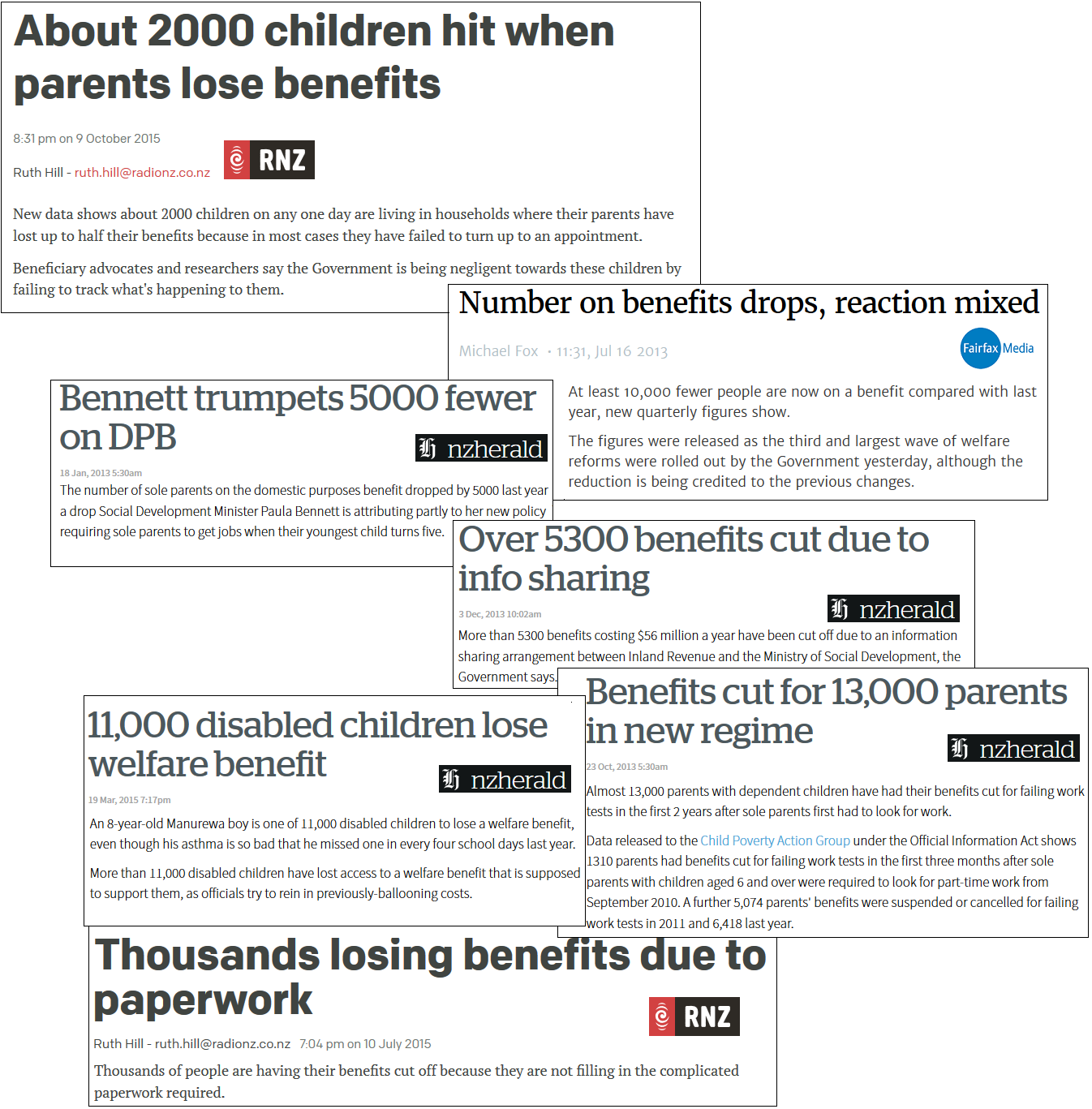
.
In September 2017, on TV3’s ‘The Nation‘, then Welfare Minister, Anne Tolley, described National’s drive to reduce welfare recipients in the most Orwellian way;
“But we do have a significant number of people who are looking for work, who are capable of working, and so most of them, it’s just a light touch to help them along the way.”
In the same interview, Lisa Owen challenged Minister Tolley on the fate of welfare beneficiaries who had been pushed off welfare. Minister Tolley admitted that she and the National government had no idea what had happened to the thousands of people, including families with children;
Lisa Owen: How do you know that they’re going on to a better life?
Tolley: Look, there’s a whole lot of people that don’t want the state in their lives. Tracking people is awful. They go off the benefit—
[…]
Anne Tolley: They go off the benefit for a whole variety of reasons.
Lisa Owen: How can you claim success, though, for that when you don’t actually know if they’re earning more money than they were on the benefit—?
Anne Tolley: We do track if they come back on to benefit, and we do have a close look at what has happened. As I say, we do do a lot of training. We do provide a lot of opportunities for people to retrain.
Lisa Owen: But you don’t know what’s happening to those people. You’ve got no idea.
Anne Tolley: We have 44% who self-identify to us that they’re going off into work. You know, people go overseas. They age into superannuation. There’s a whole lot of reasons why.
Lisa Owen: All right, so you don’t know.
Thankfully, former PM John Key was more forthcoming in 2011 that New Zealand’s “under class” was growing.
As National ramped up it’s campaign of denigration and punitive action against welfare beneficiaries and Housing NZ tenants, compliant State organisations were reaping their victims.
.
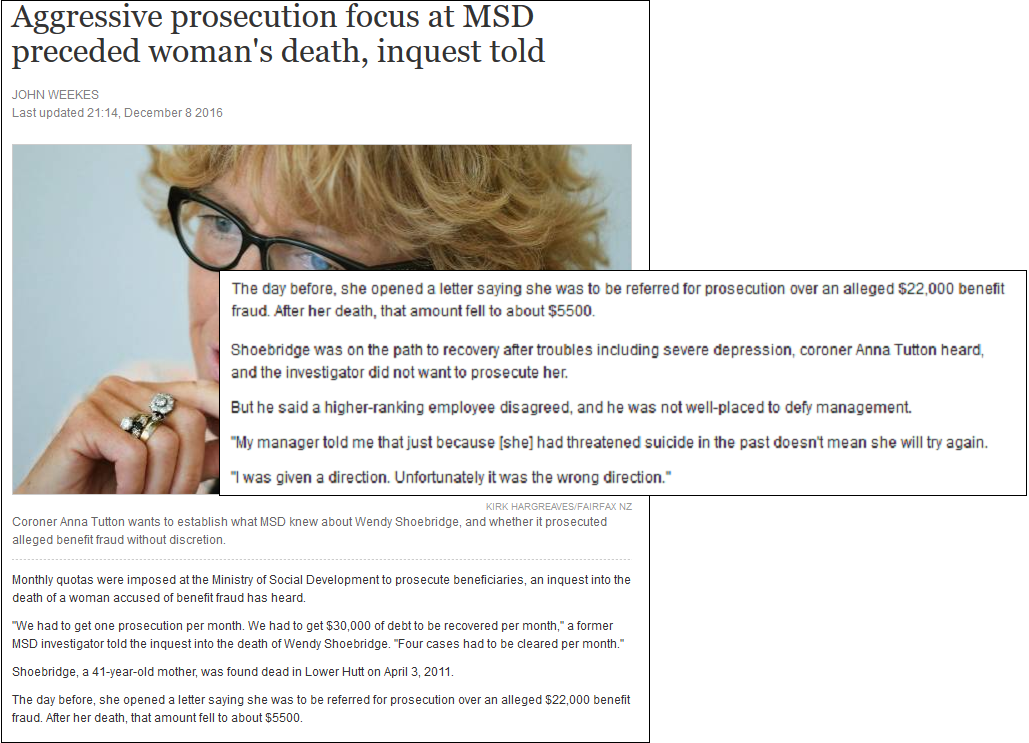
.
One was a victim of damp housing and poverty-related disease;
.

.
One was chased for a welfare debt she could have no chance of repaying – but MSD pursued it “in case she won Lotto“;
MSD was trying to recover approximately $120,000 from a chronically-ill beneficiary in her 50s who will never be able to work again. The Ministry has pursued her for years and spent a large amount on the case, even though it is plain the woman has no money and her health will never allow her to work again.
The judge asked the Crown lawyer whether it was worth continuing to pursue the beneficiary.
The lawyer responded that it was, as the beneficiary might win Lotto and would then be able to repay the money.
And the most recent example of victimising the homeless simply defies comprension;
.
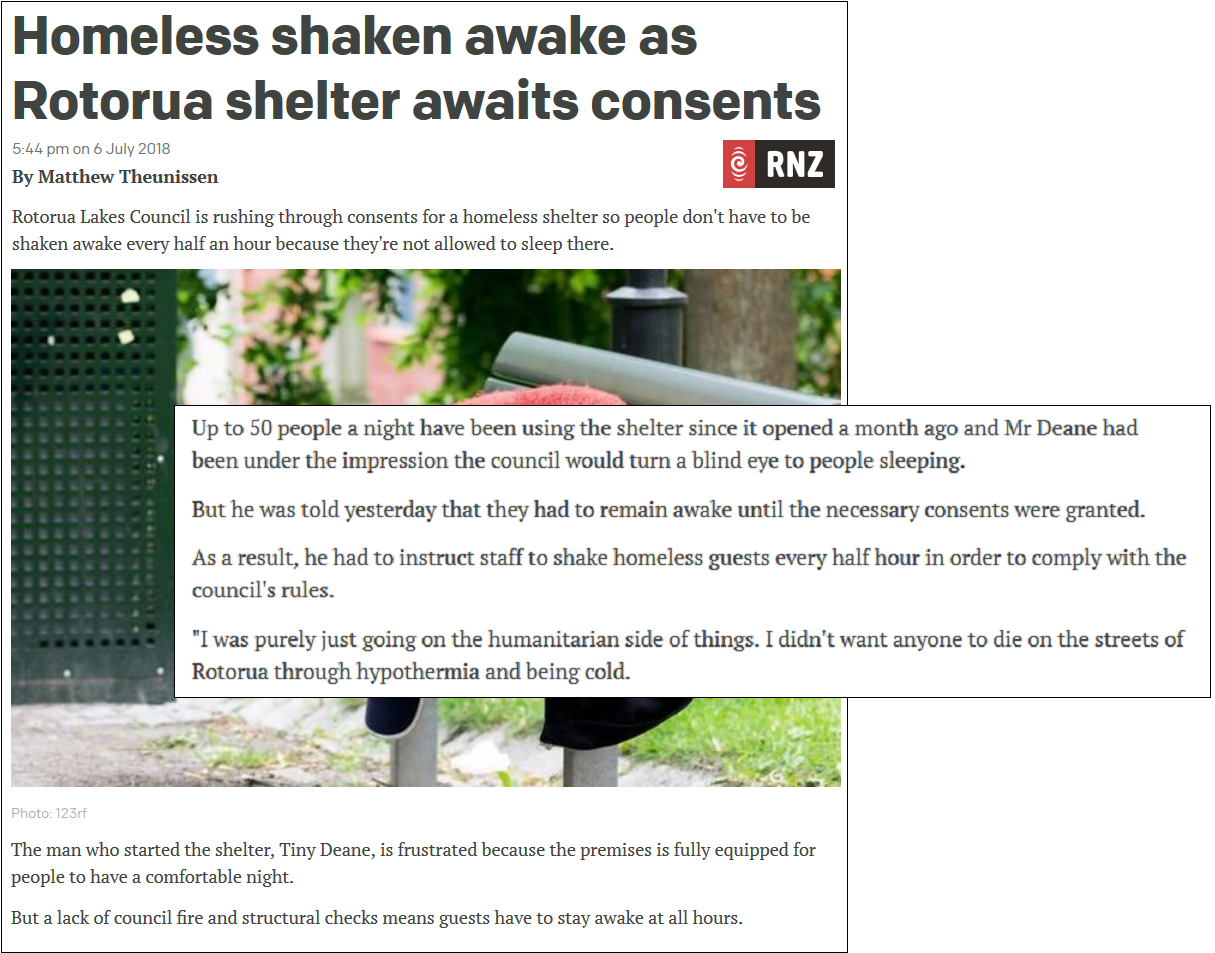
.
Homeless men at the “drop-in centre” were shaken awake through the night every half hour.
All because the facility was not compliant with fire and building consents. To it’s credit the Rotorua Lakes Council said “fire and building consents were being rushed through so people could sleep at the shelter“.
But Mr Deane – the organisor of the facility ” was told yesterday [5 July] that they had to remain awake until the necessary consents were granted”.
The common term for this is sleep deprivation.
It should not be forgotten that the practice of sleep deprivation was one of the five techniques used by the British government against Northern Irish citizens arrested in 1971. Subsequently, in January 1978, in a case taken by the government of Ireland against Great Britain, in the the European Court of Human Rights, ruled that the five techniques – including sleep deprivation – “did not occasion suffering of the particular intensity and cruelty implied by the word torture … [but] amounted to a practice of inhuman and degrading treatment“.
Sleep deprivation was determined to be a breach of the European Convention on Human Rights.
In 2010, the British government lost a Court appeal to prevent public release of a report revealing the practice of sleep deprivation torture had been used against British resident, Binyam Mohamed. The Court judgement stated;
“The treatment reported, if it had been administered on behalf of the United Kingdom would clearly have been in breach of [a ban on torture].
Although it is not necessary for us to categorise the treatment reported, it could be readily contended to be at the very least cruel, inhuman and degrading treatment of BM by the United States authorities.”
In 2014, the UN committee against torture condemned the United States for allowing sleep deprivation to be used as a torture technique against prisoners at Guantanamo Bay. The United States governments calls such practices “enhanced interrogation”.
To discover that sleep deprivation is being used against homeless men in New Zealand is disturbing.
To realise that a practice considered torture by various international organisations has barely been reported by the mainstream media – is deeply troubling.
We have reached rock-bottom as a society when people are being subjected to “a practice of inhuman and degrading treatment” – simply because they are homeless.
This is the definition of abuse against the vulnerable: they are unable to fight back because they are utterly powerless.
If this practice of sleep deprivation was carried out in our prisons, there would be a major Royal Commission of Inquiry.
But not when the subject of this abuse is the homeless. Their powerlessness is worse than men and women incarcerated in our prisons, despite being “free”.
The cruelty shown to our welfare beneficiaries; to Housing NZ tenants; and to the homeless, has been sanctioned by a sizeable ‘chunk’ of our population;
.
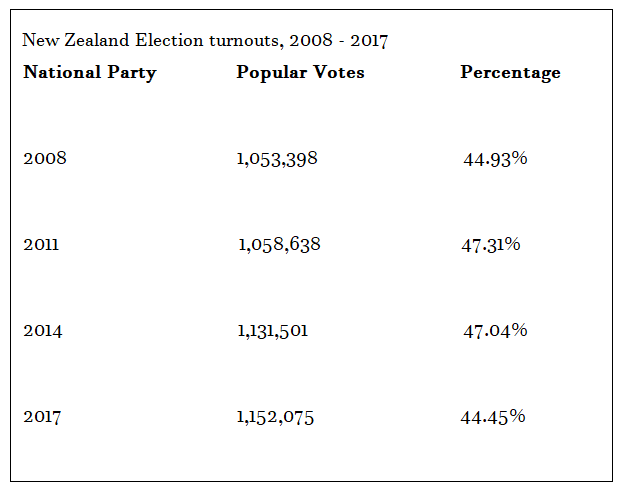
.
Fully a quarter of the country’s population has continued to endorse the National Party at four consecutive general elections.
What does this say about a quarter of the population’s attitude to what has amounted to a campaign of vilification and denigration against those at the bottom of our social-economic ‘ladder’ – a campaign that has been skillfully carried out to facilitate pushing people off welfare and selling off state houses.
This degree of callous cruelty has been led by various ministers in the previous National government who have mis-used information; misled the public; and made derogatory comments against those whose sole ‘crime’ was to be poor.
This was bullying from the highest level of power, toward those at the lowest level of powerlessness.
National’s subtle and graduated vilification of the poor made cruelty permissable in a country which once valued tolerance, fairness, and egalitarianism.
When depriving homeless men barely merits a mention in our media, and few bat an eyelid, what other possible conclusion can be made?
This Coalition government is constrained fiscally when it comes to welfare and state housing.
It suffers no such constraints when it comes to showing strong moral leadership to reject State-sanctioned cruelty.There is no fiscal cost to compassionate leadership that lifts up the powerless.
There are good men and women in Labour, the Greens, and NZ First. That is perhaps their strongest common bond between all three; a rejection of the culture of callousness that has seduced and poisoned the hearts and minds of so many New Zealanders.
Every Minister in this coalition government can reject decades of a culture of cruelty by reaffirming the humanity of the unemployed; solo-mums; youth; sickness beneficiaries; state house tenants; the drug and alcohol addicted; and the homeless.
Every Minister in this coalition government can use their position of power to speak on behalf of the powerless.
Every Minister in this coalition government can remind all New Zealanders that we are not bullies; we are better than that. If we cannot look after the powerless in our own society – then what possible hope is there for us and our children’s future, to be a compassionate society?
This will be the defining point of difference between what we have been – and what we hope to become.
This is what will inspire New Zealanders to choose what we aspire to be, and what kind of leadership will take us there.
Cruelty or compassion? Hopefully that will be the true point of difference in 2020.
.
~ In Memory ~
.
~ Emma-Lita Bourne ~
.
~ Wendy Shoebridge ~
.
.
.
References
Radio NZ: Robertson on infrastructure – $42bn ‘won’t be enough’
Fairfax media: Steven Joyce sticks to $11.7 billion hole in Government budget
Scoop media: Government delivers April 1 tax cuts, SME changes
Scoop media: Govt’s 2010 tax cuts costing $2 billion and counting
NZ Herald: John Armstrong – Labour confined to a fiscal straitjacket
Dominion Post: ‘Pressure valve’ medics patch up night’s drunks
Fairfax media: Alcohol – How can we reduce the harm it causes?
RBNZ: Banking crises in New Zealand – an historical perspective
NZ Herald: July 1984 – When life in NZ turned upside down
The Encyclopedia of New Zealand – Te Ara: The ‘mother of all budgets’
Wikipedia: The Alliance
NZ Initiative: Defeating the trickle-down straw man
The Atlantic: The Education of David Stockman
NZ Herald: Home ownership rates lowest in 66 years according to Statistics NZ
Interest.co.nz: Housing mortgage rates are more likely to go down rather than up
Fairfax media: Bank of mum and dad could be NZ’s sixth largest first-home mortgage lender
NZ Herald: Auckland teen couple face sleeping in car
TVNZ: More homeless people sleeping in cars
Mediaworks/Newshub: The hidden homeless – Families forced to live in cars
NZ Herald: Minister spells out $43,000 ‘salary’ claim for solo mum
NZ Herald: Benefit cuts for drug users defended by PM
NZ Herald: Bennett increases pursuit of welfare ‘rorts‘
Fairfax media: Key – Mums of one-year-olds better off working
NZ Herald: Food parcel families made poor choices, says Key
NZ Herald: Beneficiary birth control ‘common sense’ – Key
Fairfax media: House call plan to nab benefit fraudsters
NZ Herald: Unions demand Bill English apologise for describing jobseekers as ‘pretty damned hopeless’
Fairfax media: Bill English says employers are regularly telling him that Kiwis can’t pass drug tests
Twitter: Newshub – Bill English “soak up staff out of McDonalds”
Frankly Speaking: Fact Sheet – Employment-Unemployment and Queues for Vacancies
Dominion Post: State tenants face ‘high need’ review
Fairfax media: Nearly 600 state house tenants removed after end of ‘house for life’ policy
Fairfax media: Housing policy will destabilise life for children
NZ Herald: State housing shake-up – Lease up on idea of ‘house for life’
Fairfax media: Housing policy will destabilise life for children
NZ Herald: ‘No point’ in new state houses – Bill English
National: New crack down on gangs and drugs
Radio NZ: Paula Bennett: HNZ too cautious on meth testing
Beehive: PM appoints Chief Science Advisor
NZ Herald: Minister claims low drug result as victory
NZ Herald: Bennett trumpets 5000 fewer on DPB
Fairfax media: Number on benefits drops, reaction mixed
NZ Herald: Over 5300 benefits cut due to info sharing
NZ Herald: Benefits cut for 13,000 parents in new regime
NZ Herald: 11,000 disabled children lose welfare benefit
Radio NZ: About 2000 children hit when parents lose benefits
Radio NZ: Thousands losing benefits due to paperwork
Mediaworks/TV3: The Nation – Welfare Debate
NZ Herald: Key admits underclass still growing
Fairfax media: Aggressive prosecution focus at MSD preceded woman’s death, inquest told
NZ Herald: Damp house led to toddler’s death
Catriona Maclennan: Loans to feed kids are income and disqualify benefit, says MSD
Radio NZ: Homeless shaken awake as Rotorua shelter awaits consents
European Court of Human Rights: Case of Ireland v. The United Kingdom
BBC: Binyam Mohamed torture appeal lost by UK government
The Guardian: UN torture report condemns sleep deprivation among US detainees
Wikipedia: New Zealand general election, 2008
Wikipedia: New Zealand general election, 2011
Wikipedia: New Zealand general election, 2014
Wikipedia: New Zealand general election, 2017
Additional
Gordon Campbell: Ten Myths About Welfare – The politics behind the government’s welfare reform process
Other Blogposts
Public Address: We are, at last, navigating out of the “meth contamination” debacle
Pundit: Beneficiary ‘impact’ highlights poverty of social policies
The Daily Blog: A Fair suck of the sauce bottle!
The Daily Blog: New Government response to MSD sadism is just not good enough
The Standard: Loans to feed kids are income and disqualify benefit, says MSD
Previous related blogposts
Easter Trading – A “victimless crime”?
Professor Bill English lectures young New Zealanders on free education
The Mendacities of Ms Amy Adams – “hidden borrowing”?!
Tracy Watkins – Getting it half right on the “Decade of Deficits”
.
.
.

.
.
= fs =






The first thing that comes to my mind is the historical period and the cultural attitude associated with it. Furthermore it’s counter movement in the romanticism that came after it and to this day you can very clearly trace the conflict between the two left / right worldviews in our media.
The Enlightenment between 1600s to 1700s in Europe and European colonies in which people began to reject the notion of “revealed truth” and confidence in ancient authority in favor of systematic examination of the world, discussion and the power of applied knowledge. From this period we get science, egalitarianism and democracy as opposed to doctrine, heirarchy and monarchical rule (though there are more steps involved in each which feed into other previous eras, but frankly this is the case for much of history as we all stand on the shoulders of giants).
Sure, you can feel enlightened but that’s not the most trustworthy of feelings. I’ve mentored to many students who seemed absolutely genuine in their claims that they truly understood a concept – only to fail at the application of it again once it was slightly different than the examples given before. Whatever part of the human brain is responsible for checking the validity of mental models you build it’s extremely susceptible to emotional bribery.
We still have a big percentage of NZ-ders that vote and support those national lying scaremongering mongrels Frank. Yes despite the mess our country is in are they blind deaf or dumb or all of that or are they just pure selfish and greedy. I think they are probably the whole lot wrapped up in a bundle.
its gone beyond timid pokes at legislation, the poor are angry, look out for blow back, build a society on lies and privilege then be prepared for lawlessness on a mass scale, you got the guns but we got the Molotov cock tails, treat us like scabies we will fuk you up, property burns, rich ppl burn, farmers burn good, dumb ass university grads burn best of all, everyone ready for Guy Fawkes
Extending all this charity is nice & fine until you realise the recipients are not helping themselves. In fact some are deliberately arranging their affairs to maximise what they can scrounge.
Be honest Frank: You know this is the case.
In NZ we’ve gone so far down this road that we now face the 3rd and even 4th generation of hopeless people.
These lost souls know nothing about education, working for a living or even caring for themselves and their family. Too depressed and hapless to get off a sofa in some cases. This is where open-ended welfare has taken us.
Your generalisation is unsupported by any evidence, Andrew. It’s based on ignorance and a prejudiced worldview.
You haven’t read my article in full, nor followed at least one critical link: https://fmacskasy.wordpress.com/employment-unemployment-fact-sheet-1-queues-for-vacancies/
this just the sort of narrow minded comment that denotes the very problem that does exist today, created bye fake news in a fake media bye corrupt politicians in a slave labour state, itll only take health problems followed up buy unemployment to show you the errors in your summation, all these conditions where created purposefully, it started with the business round table in Rob Muldons time, employers want low wages no unions and no social safety net, hell they love cardboard box citys and staving children, look at what the great capitalist state of america does to its poor, we had exactly that situation as well before our ancestors closed the docks at the start of the 20th century, social welfare buys you social cohesion
What evidence do you have for those claims, Andrew? Your denigration of unemployed doesn’t detract from Frank’s blogpost, it validates it perfectly well. Bigotry without supporting evidence remains bigotry.
Oh Andrew, your fantasist prejudices are tiresome. In lieu of hard information, all you have to offer is lies?
Frank references every bit of information and you respond with made-up stereotypes you scrapped of the walls at Whaleoil? You are intellectually bankrupt.
There’s no way the Nats could have gotten away with half the shit they did without wide ranging support from a significant chunk of the population. And that worries the fuck out of me, that some NZers can be so uncaring and cold-hearted. The Nats just tapped into what already exists in our society and fed it the prejudice it craved.
Did they tap into something already existent Mjolnir, or did they help to create it, and if so, did they do so deliberately ? I think so.
The demonisation of the poor in NZ is likely fairly racially based, but people are too scared to say this sort of thing.
The cold and clinical way in which Key and English disparaged and debased our young men was exceptionally cruel, more so considering their tragic suicide rates. I won’t forgive those two for that for that, I see no reason to.
That many young people, and a huge number of our prisoners, lack basic things like literacy skills is a major indictment of our education system and of the basic social structures which impinge upon those who need them the most. It is in all of our interests to have a socially cohesive society, and perpetuating the myth that all the hapless or hopeless choose to be that way is dumb, and achieves nothing useful at all.
As true as this article is, it fails to address the elephant in the room that is where money comes from. As long as money is lent into existence by banks and extinguished as a loan is repaid governments will be able to claim there’s not enough money or that budgets have to be balanced. If money were provided to the economy by treasury or the reserve bank not only could it be directed where it’s needed but it’s supply could be used to manage the economy. The first Labor government used treasury money instead of “borrowing “ its own money from banks as we accept today. Money is a social good and it’s role in society is too important to be left in the hands of bankers.
smart common sense policy, so you just answered your own question
Yeah right on Frank. A major problem I see in NZ is total lack of empathy in that quarter. They’re doing well, stuff the rest, blame the parents and who cares about the losers. Well, I care but what can you do? These selfish, greedy and ignorant aholes are the real problem. National are simply waving the flag for these detestable parasites.
Went through Epsom yesterday, saw a fair few large villas up for sale, between 1.5 and 3.5 million a piece, the property monopoly is heating up again. Those who can play that game, they do not give a donkey’s arse how others fare in the same country.
100% Frank as usual;
This is yet another stunningly compenduim of history showing the cunning schemes of the sacked National Party as rabid, savage, animals just on the hunt for finding money to take from the poor and middle class to prop up their own funding for election bribes for the privleged and rich class.
Yet the media never called them savage cost cutters did they or claim they were just triming back costs of the social services budgets, so the media was in colllussion with the last carpet bagging Government weren’t they? National made sure they would leave a ‘toxic hole’ for labour to fall into.
“National’s tax cuts of 2009 and 2010 were not just an election bribe at a time the country could ill afford them – they were a strategic move to constrain a future Labour-led government in a tight fiscal straight-jacket.”
This is a very good article, and I am sorry to see no comments on it just yet. My worry is that state sanctioned cruelty is also part of the deal, and that at best it will only be somewhat modified until the pressure for real change gains an unnerving edge. Look at the way David Cunliffe was treated, and he was hardly Che Guevara. Look at how swiftly Metiria Turei was dealt to. It is not just about budgets, though they are the thing to point to, it is also about suppressing political alternatives.
‘The Free-market, Hyper-individualism… and a Culture of Cruelty?’
“A certain amount of callousness; disdain; and outright hatred must replace compassion, egalitarianism, and a sense of community cohesion if the neo-liberal version of “society” is to operate successfully.”
Yes, you describe present day NZ Inc PERFECTLY, I see it all around me every single day, that is the summed up status quo we have, and like an abused child, those suffering under it rather go and abuse others as well, than wake up, and face their issues, and reform and seek recovery from their ills.
A very SAD state of AFFAIRS we have, and this government is not going to be able to turn back the tide, not the way they are going so far.
“It is the reason why neo-liberalism never took hold in Scandinavian countries.” Care to elaborate? Because mwulticwultuwawism and cultural Marxism are of the Right? Indeed
When atomised, alienated individuals rely on “The State” to take care of them at the expense of the politically and economically dominant culture, they are always at risk of that dominant culture eventually refusing to do so. That is simply a fact.
The only answer is for atomised, alienated individuals to somehow learn to reorganise themselves into their own politically and economically self-supporting communities, strong enough in their own right to make State assistance completely unnecessary. This will also have the happy effect of making them the politically and economically dominant culture.
In other words, we need to rediscover genuine Socialism, and abandon Statism as a failed project.
So you suggest land occupations and the likes, to seize the assets and resources that would enable people to make a more independent living? I wonder how that can be realised and put into practice, with the share of wealth distribution we have, and the powers that be having a mercenary police force and military to their avail, to shift any dissenters off any properties they may occupy.
Keep dreaming, such things will not happen without resolute, firm revolutionary action, which will necessitate forms of FORCE.
Marc the powers that be, simply seized all those state owned assets for themselves, we as a population owned all those assets and resources, we built them we owned them we all benefited from them state management in the form of jobs and working conditions. It was redistributed into private ownership bye governments on both sides of the political divide to the people that financed their political party’s election campaigns, and that right there is the real problem in NZ, currently both parties are financed as 2 sides of the same coin, its just history repeating itself, the onset of colonialism here held the same treatment for the native peoples, which is also repeating itself, thats what happens when you dont teach your own history to your own children, do you see a pattern?
Nobody, a District Court judge talked to me passionately about a specific patch north of Auckland (I think, my geography is lousy) with second and third generation beneficiary dependency, which he said no-one gave a damn about – and he alluded to Key and English in libelous terms. I researched the place later and it looked like a Fonterra issue impacting upon what had previously been a predominately productive dairying area.
When a whole area is economically impacted, the dynamics can be overwhelming. Relocate a town or a village every time a mill or factory closes ? Disperse a complete community en masse ?
These things are happening, and they will continue to happen. It is not unreasonable to expect central govt to lend a constructive and helping hand here, and consider how they can best make use of the human resources available. Do they ?
They take the easy way out, provide benefits, entrench and enable feelings of helplessness, and ease the way for sanctimonious little prats to whinge online about beneficiaries lounging on often non-existent couches watching totally awful free- to- air television and thinking this is their choice.
Socially and economically alienated folk aren’t necessarily in an optimum position to help themselves; fortunately there are some NGO’s working to help forge new pathways, and forge constructive pathways; they are nearly always under-funded; but were the ignorami to consider how to address the issue of what annoys them they may actually have something to contribute, but their need to be haters may, regretfully, preclude this from eventuating, and consign them to forever being urban cow pats.
@Marc @Christine, thank you for your replies; underlying my comment is an assumption which should probably be stated more plainly – Socialism is not a set of guiding moral principles, it is a complete alternative political-economic system.
If we practice socialism as an economic system, then we, the working class may decide, as happened in Mondragon, that we are no longer satisfied with living on the crumbs falling from the table of the State. Instead, we pool our talents and resources and we begin accumulating community property under collective ownership. The more we do this, the more secure and prosperous we become, and the less reliant we are on do-gooders and Statists.
Even as I write this I can hear various sectors of the Left gasping. There is a Cult of Poverty which would keep the poor in poverty as a matter of virtue (this is a sickness with some). There are also those who regard the poor as their “constituents”, who fear losing their power if poverty were eliminated (this is evil).
No, genuine Socialism is about prosperity, security and power for the working class. The practice of Socialist political economy frees us from dependence on the State, even as it frees us from poverty. If it does not accomplish this, then it is something else, a moral crusade, State Capitalism, what have you, but it is not Socialism.
This is what we want. Not charity, not “a kinder, gentler society”, or “Capitalism with a Human Face”. We want Socialism.
Sometimes it may also be possible to bring about change by working to modify what already exists, and by improving upon it.
As with any ism, this largely depends upon society recognising the need for change and wanting to change – just like the light bulb…
I suggest that any effective ism/political/economic system addresses the well-being of all citizens rather than transferring “power” from one group to another, and that any ism which rejects kindness and gentleness as attributes of a healthy society is just another form of what we already have now.
Free Market is a load of B/S.
[…] blogpost was first published on The Daily Blog on 10 July […]
Comments are closed.